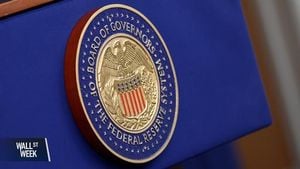A Culver City man has agreed to plead guilty to the reckless operation of a drone, which crashed and damaged a Super Scooper firefighting aircraft during the Palisades Fire earlier this month, federal authorities announced. Peter Tripp Akemann, 56, is set to face federal charges for his actions on January 9, 2025, when he launched the drone from the top level of the parking structure at Santa Monica's Third Street Promenade.
During this incident, the drone traveled more than 1.5 miles back toward the flames of the Pacific Palisades. Unfortunately, the drone collided with the Super Scooper firefighting plane, which was working tirelessly to combat the wildfire. The crash resulted in significant damage—a three-by-six-inch hole—on the left wing of the aircraft, prompting immediate repairs and effectively grounding the plane, thereby interrupting its firefighting mission.
Federal prosecutors indicated on Friday morning during the announcement of the plea agreement, Akemann will plead guilty to one misdemeanor count of unsafe operation of an unmanned aircraft. This plea agreement carries with it serious legal repercussions, including possible restitution payments estimated at about $65,169, covering the costs incurred by both the Government of Quebec and the aircraft repair company.
The damage to the Super Scooper proved to be particularly costly for the firefighting efforts, as the aircraft was sidelined for approximately five days during the peak of the fire, which grew significantly during the incident. Acting United States Attorney Joseph Teal McNally noted, “This damage caused to the Super Scooper is...to conduct operations.”
Akemann’s drone flying activities occurred during temporary flight restrictions implemented by the Federal Aviation Administration (FAA) which were set to safeguard airspace for frontline responders battling the blaze. Despite these restrictions, Akemann pursued making aerial observations of the wildfire, raising questions about the judgment of drone pilots during such hazardous situations.
Witness reports and investigations led authorities to determine Akemann was responsible for the drone, especially after officials identified parts of his drone wreckage lodged within the damaged wing of the Super Scooper. A key concern echoed by federal officials was how such reckless actions imperil first responders, who face enough dangers without additional threats from unauthorized drone operations.
“This defendant recklessly flew an aircraft...trying to protect lives and property,” McNally stated. The ripple effects of such negligence include glaring risks to personnel engaged in firefighting efforts and the continued ability of emergency services to operate effectively during crises.
Akemann has agreed as part of his plea to participate in 150 hours of community service, aimed at assisting the 2025 Southern California wildfire relief effort, emphasizing his cooperation with authorities following the incident. His attorneys conveyed statements indicating he is “deeply sorry” and accepts responsibility for his actions, framing his decision as one guided by ignorance of his duty as a drone pilot, alongside hopes to mitigate the ramifications of his decision.
Legal representatives Glen T. Jonas and Vicki Podberesky stated, “There are several mitigating factors...that feature” referring to issues with the drone’s geo-fencing safeguards. Despite such features, safety regulations prohibit drone pilots from flying their aerial devices during emergencies like wildfires, exemplifying the need for awareness and compliance among operating drone pilots.
The Palisades Fire itself posed considerable challenges to firefighting crews, who faced fierce winds and the risk of the blaze spreading significantly, consuming thousands of acres and resulting in devastating loss and destruction to communities nearby. Throughout the efforts, aerial rescue equipment and firefighting aircraft form the backbone of combating wildfires, making any interferences, such as unauthorized drones, significantly impactful.
Akil Davis, Assistant Director of the FBI's Los Angeles Field Office, reiterated the importance of adherence to safety regulations, asserting, “Lack of common sense and ignorance of your duty as a drone pilot will not shield you from criminal charges.” He conveyed the severe risks of operating drones outside authorized parameters during wildfires, directly affecting firefighters’ operations.
The case is still coursing through the U.S. District Court, where future appearances by Akemann will finalize the proceedings. Akemann’s actions serve as both cautionary tales for drone operators and as stark reminders of the responsibility underpinning their usage, particularly during climactic emergencies.
The repercussions of this incident exemplify how drone misuse can disrupt emergency protocols, undermining the efforts of those striving to preserve lives and properties threatened by natural disasters. Akemann’s plea indicates accountability and serves as part of the discourse on the growing need for regulations and safe practices governing drone usage, especially amid crises.



